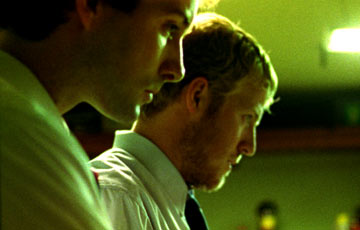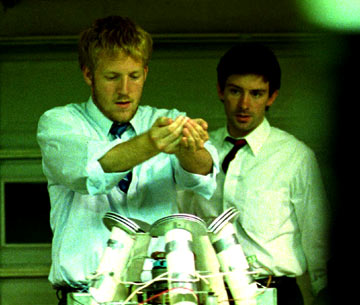Primer


Shane Carruth is the brains behind Primer. Before he became a filmmaker, he was an engineer, and his experience shows. The characters in the film speak in dense, almost impenetrable terms familiar to anybody with a scientific background. Carruth scripts things purposefully vague. It is enough to understand that all the characters know what they are talking about, and are working on something tangible and believable. This is unlike other films, especially ones that take place in college classrooms, and show things like algebra on the chalkboard in the background. The flipside is that for people with little to no scientific background, most of the dialogue will sound like gibberish. Carruth deserves a lot of credit for not dumbing down the script so that the Joe Idiot can understand it. This is a smart film, and requires a significant mental investment in order to enjoy it to its fullest extent.
Carruth has all the actors speak with a near monotone, staccato-like delivery. These are all engineers here. They have little time for small talk. It is easy to get lost in the vocabulary. Four friends are working on some unnamed project in a garage. Whatever they are doing tends to fail a lot, and they spend a decent amount of time trying to figure out what direction to take next. Things change when Abe (David Sullivan) discovers something really strange. He tests and retests, then confides to Aaron (Carruth) his findings. He hesitates telling Aaron everything, wanting Aaron to discover for himself the strange results that Abe found.
Abe has found a way to move things though time. He cannot figure out exactly how he got to this, but the results are clear. What sets Primer apart from other films is that Abe and Aaron are rational, thinking, realized characters. They are extremely curious about what the ramifications are, yet frightened at the possibilities. Each experiment takes things a little farther, and makes them a little more nervous. They start simply, by doing things like playing the stock market. It's really easy when they know where a stock will be at close. As they accustom themselves to small things, they become more ambitious. They try for bigger things, and worry about potential paradoxes that may occur. They become more paranoid, suspicious at the people around them and ultimately at each other. Carruth piles on the paranoia, as the aims of both men begin to diverge. Each one wants different things, and thinks the other is conspiring against him. Primer becomes extraordinarily difficult to follow as it nears its conclusion, but everything does play out correctly if one pays attention.